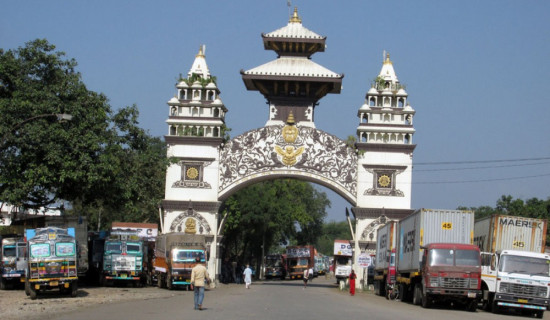- Sunday, 15 February 2026
Preparedness Must For Food Security
The “red” anger expressed by the farmers in Nepal by throwing tomatoes demonstrated the injustice they are facing due to unequal market access and lack of the ability to sell and earn. Similar expression of frustrations has been demonstrated in Nepal and other South Asian (SA) countries at different times as farmers from poorer countries face the brunt of unequal market more severely. People are now trying to regain their livelihoods back after the impact of COVID-19 pandemic. The struggle of the have-nots in regaining the loss caused by the pandemic and ongoing climate disasters like floods, landslides and earthquake becomes more compounded because of the food insecurity that they face.
As earnings decrease, intake of sufficient nutrition decreases too. When flow of food into households commences, it affects all, but girls and women are affected more adversely within households while men are then driven to migrate to earn to suffice the deficiency. Just as the pandemic subsided, the world is witnessing the Russia-Ukraine War. Its impact in SA may not be direct, but the region has definitely been affected by the global rise in food, fuel, and fertiliser prices. The war has led to increase in food prices sharply contributing to food insecurity.
Rising inflation
According to the Global Food Policy Report 2023 – Rethinking Food Crisis Responses published by the International Food Policy Research Institute (IFPRI) “…in September 2022 the year-on-year consumer inflation rate for food was 66 per cent in Sri Lanka, 36 per cent in Pakistan, and about 8 per cent in India, Bangladesh, and Nepal.” The inflation in Pakistan and Sri Lanka is attributed mainly to macroeconomic instability and mismanagement, especially the sharp devaluation of their currencies, and the fertilizer ban in Sri Lanka. The disruption in the food production and distribution systems affects mainly those countries which are struggling to get out of not only the pandemic but a series of natural disasters and impact of globalised market economy where the poorest farmers often face obstacles in getting an equal share of the market.
SA is a region that has always been vulnerable to various environmental shocks. The IFPRI report states that natural calamities related to climate change have become increasingly frequent over the past two decades. Record-breaking heatwaves in Afghanistan, Bangladesh, India, southern Nepal, and Pakistan – which also suffered from devastating floods – posed a serious threat to life, livelihoods, and economies. Political instability and violence also threaten food security in the region. Since their independence, many South Asian countries have experienced political instability caused by civil wars and ethnic and sectarian conflicts. As a result, a sizable number of people have been displaced.
Displacement of people of leads to migration. There has been a rise of Nepali migrants in search of better paying jobs and food sufficiency. During my coverage of human trafficking cases associated with migrant workers, especially labour migrants I have often encountered individuals who have shared facts that they were exploited in wages and access to food leading towards more poverty, malnutrition and mental health issues. There are also issues faced by domestic migrant workers leading towards their exploitation both in wages and food. A cook in a restaurant at Bagbazaar, in Kathmandu, recently informed that he did not get the three times meals that he was assured when the job was offered to him. He had to buy food that he cooked or go hungry! SA countries are often always in political instability. Politicians are more concerned and concentrated in winning elections and prized government positions rather than addressing the needs of their population. The Global Food Policy Report 2023, South Asia, was launched by IFPRI in Kathmandu on 19-20th June 2023. It recommends that now the time has come to move towards more permanent response to food crisis guided by strong evidence on the impact of policies, programming, tools and governance approaches.
The IFPRI report mentions that many governments, donors, and international organisations have called for moving beyond humanitarian responses that are implemented only after a crisis begins, toward better prediction, preparation, and resilience building that will make future crises less devastating. While discussions of a humanitarian-development-peace approach have been underway for years, the newly released IFPRI report suggests that there is a need to provide a solid policy basis for moving forward. The Report explores a growing body of evidence on how diverse policy responses can reduce both the immediate and longer-term impacts of food crises, and improve livelihoods, incomes, and food security and nutrition for the future.
Early-warning systems
Some of the main points that the IFPRI report suggests is to establish an early-warning systems which can facilitate pre-emptive, rapid, and context-appropriate responses to food security and to look into having an anticipatory action framework, which help prepare and organise humanitarian aid before crises strikes, together with setting an agrifood value chains which can support livelihoods. Social protection systems are essential to reducing the impact of crises as they can build resilience prior to a crisis. It indicates that integrating social protection with gender and climate goals can further empower women and promote sustainability.
Improvements in collecting gender-disaggregated data, particularly amid crises, and tracking progress toward clear gender targets can promote gender equality. As usual reports like this and others come up with valuable data that can improve the lives of people globally. However, it is important to make sure that such data are utilised and not left to gather dust over the years. It is also very important to make sure that data generated by institutes like IFPRI does not remain only within reach of policy makers. It needs to be reproduced in simplified version that can be accessed and used by farmers, migrants, women and marginalised population via the digital network to improve their food security.
(Sharma is a senior journalist and women rights advocate namrata1964@yahoo.com Twitter handle: @NamrataSharmaP)

















